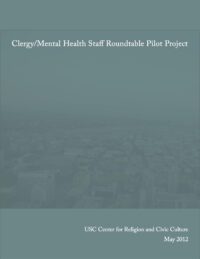Existing Collaborations
While one of the goals of the Roundtable is to increase opportunities for collaboration between MH staff and clergy, it is important to note that a significant amount of collaboration was already taking place before the Roundtable pilot program began. For example one MH staff member, a regional program director, worked with two MFTs and an LCSW to create a peer/lay counseling program at his church: “We screened and trained and support a number of volunteer peer counselors in the community. We oversee and continue to support that particular project.” One clergyperson started a new church in an independent living facility for mentally ill, yet stable adults. They held weekly Bible studies and worship service in the recreational area of the complex.
Collaborations also existed in the form of consultation with MH staff who were not necessarily at DMH. Nearly all of the clergy interviewed said that although they may not have consulted with someone from DMH, they did at times contact a clinician for consultations. The clinician contacted was usually a private practice therapist they knew, or had been referred to from a list, for example as might be obtained from a group such as Catholic Charities. Recognizing the significance of religion in the lives of his predominantly African American clientele, one MH staff said that he would consult with clergy to get their views on medication, treatment and mental illness, even before the Roundtable began.
Another form of collaboration involves providing space for spiritual resources at treatment centers. One MH staff related that at her agency, an empty office was converted into a meditation room so that consumers and staff could have a quiet place for reflection and prayer. At another DMH contracted agency, donors support an onsite chaplain. The chaplain is available as needed when staff need consultations. The MH staff person who was interviewed said that over the several years he’s been at the agency that, “I wouldn’t say it’s something that been frequent for me, maybe four times over the years.” However, in his private practice, he has made spiritual resources available to his clients upon request.
Embracing the Idea of Collaboration
Although many of the clergy and MH staff had already engaged in some form of collaboration, for some this was a new idea. For example, this clergyperson explained how the Roundtable had influenced his thinking:
[B]efore I might not think of going to mental health and looking for resources. Now I would be more aware of it and I would have no problem in calling them. “I would like you to come and do a workshop that deals with anger” or “What are some of the key things to look for in mental health that’s getting out of hand.”
Another clergy member’s lack of knowledge about available resources had prevented him from making referrals. When asked if participating in the Roundtable had increased his likelihood of making referrals to MH staff, he said,
Yes. I have phone numbers. I can refer people to an emergency line. I’m definitely open to that. I didn’t before because I didn’t know. Before the Roundtable, I didn’t have any of the resources.
Thus, clergy and MH staff are embracing the idea of collaboration because they see that some of the help consumers need is beyond their own scope of practice. In those situations, teamwork between clergy and MH staff is seen as vital, as one clergyperson said,
We know that when there’s people that can’t be delivered and they need help that’s beyond our scope, we need to send them to the mental health clinics. Mental health clinics, when somebody’s so drugged out they can’t give them any more drugs, they need to send them to church. We’re both on the same page, working, trying to help people in our community. I’m a voice to that.
Future Plans for Collaboration
Whether MH staff or clergy had engaged in some form of collaboration prior to their involvement in the Roundtable, they were eager to pursue more collaborations and that the Roundtable was extremely instrumental in providing opportunities for cooperative involvement in community care. Toward that end, many of the Roundtable participants were already making and carrying out plans to collaborate with colleagues they had met through the Roundtable. Some of the plans mentioned include the following: 1) having a clinician onsite at a congregation at least once a week to counsel congregants, 2) inviting clergy to set up a booth at a mental health fair, 3) inviting a clinician to address a congregation about mental health issues, 4) offering parish space for workshops on parenting, marriage and drug addictions, and 5) having “health month” at congregations in which the topic of mental health and illness was addressed.
Thus, the Roundtable both built on participants’ previous experiences with collaboration and referrals, and provided opportunities for new relationships to develop, laying important groundwork for continuing consultation and referrals between MH staff and clergy.
